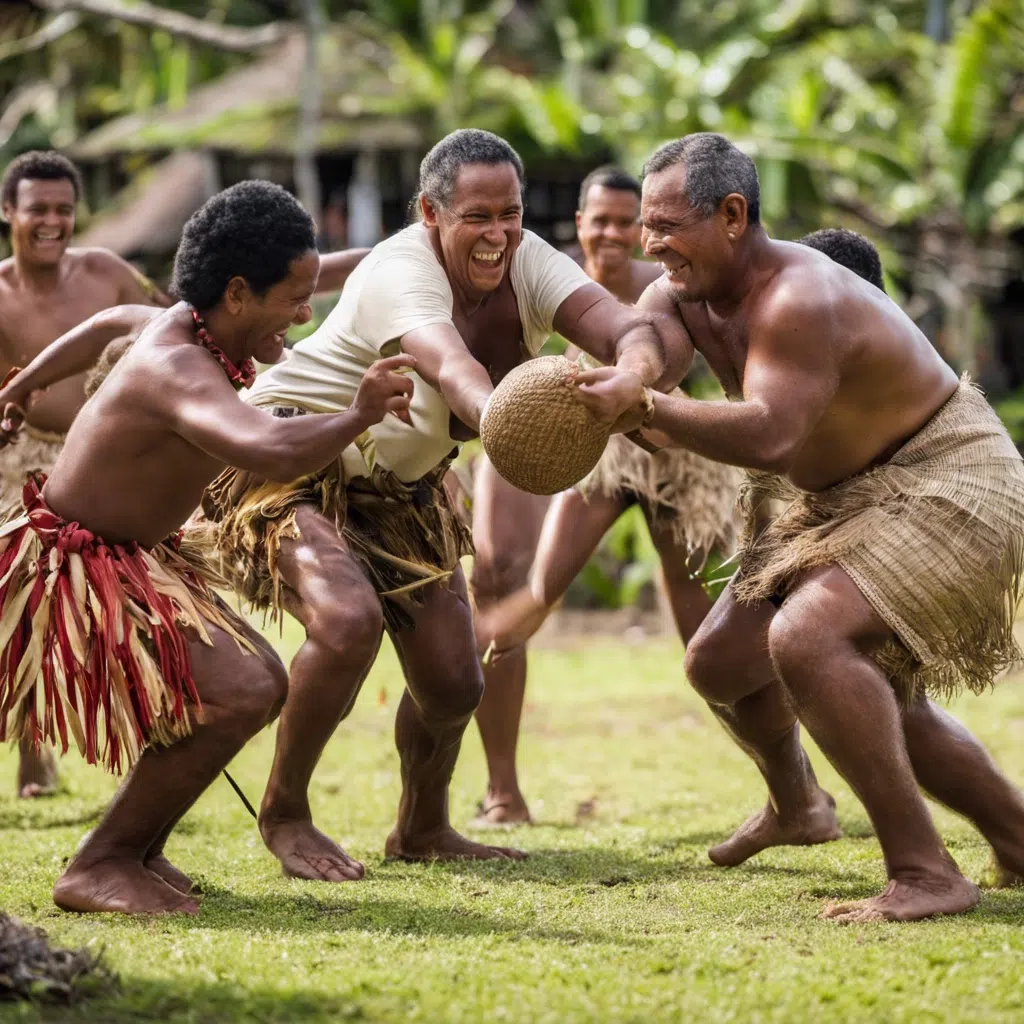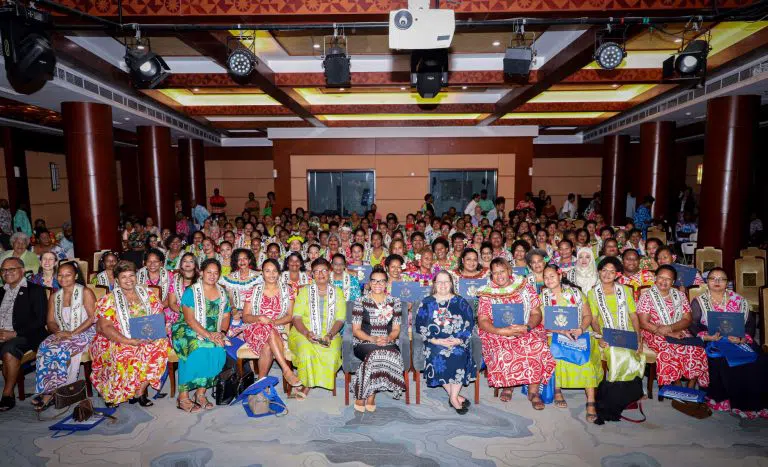Fijian traditional sports and games
Fiji, with its paradisiacal beauty, has a far reaching history entwined with fierce competition. In the late 1700s and 1800s, Fiji gained notoriety as a land of ferocious warriors that sometimes practiced cannibalism. Yet, in times of peace, traditional games thrived, becoming an integral part of Fijian life. A few decades ago, as Fiji has embraced Westernization, the traditional games of yesteryear took a backseat. The iTaukei people of Fiji decided to change this fate, and now, thanks to their dedicated efforts, these games are now making a triumphant return. Laughter, camaraderie, and a renewed sense of cultural pride are resounding once more.Here are some of these traditional games:
Vaqiqi Moli: Rolling Towards Romance
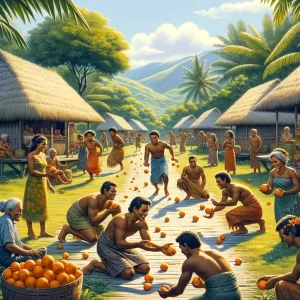 One of the most popular games of the past was “Vaqiqi Moli,” also known as the “rolling of the orange.” Village elders would organize this game when they observed an increase in the number of eligible bachelors and spinsters in the community. The game was both playful and purposeful, as young men rolled oranges toward young women. The lucky woman who picked up the orange became the young man’s wife, showcasing the courtship rituals of the time.
One of the most popular games of the past was “Vaqiqi Moli,” also known as the “rolling of the orange.” Village elders would organize this game when they observed an increase in the number of eligible bachelors and spinsters in the community. The game was both playful and purposeful, as young men rolled oranges toward young women. The lucky woman who picked up the orange became the young man’s wife, showcasing the courtship rituals of the time. Lipi: The Hockey of the Pacific
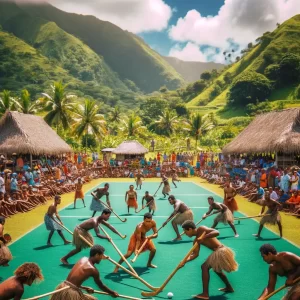 Fiji has its own unique take on hockey called “Lipi,” which holds a special place in Fijian hearts. Played with fervor and skill, this traditional game showcases the agility and coordination of Fijian players.
Fiji has its own unique take on hockey called “Lipi,” which holds a special place in Fijian hearts. Played with fervor and skill, this traditional game showcases the agility and coordination of Fijian players.
Veibo: The Fijian Art of Wrestling
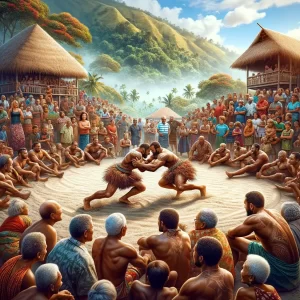 Wrestling, or “Veibo,” may have foreign origins, but it is a source of fun and laughter in Fijian communities. Wrestlers engage in friendly combat, attempting to push their opponent out of bounds or make them land on their back. While wrestling is taken very seriously globally, in Fiji, Veibo’s main objective is camaraderie and amusement.
Wrestling, or “Veibo,” may have foreign origins, but it is a source of fun and laughter in Fijian communities. Wrestlers engage in friendly combat, attempting to push their opponent out of bounds or make them land on their back. While wrestling is taken very seriously globally, in Fiji, Veibo’s main objective is camaraderie and amusement. Ai Bo: Strength in Hand Wrestling
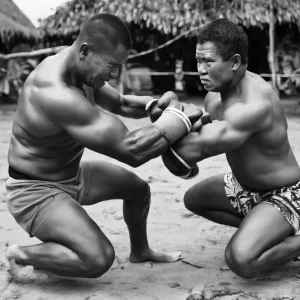 “Ai Bo,” or hand wrestling, is another favorite among Fijian men. It is a test of strength and skill, with participants trying to force each other’s backhand to the ground. The winner is the one who succeeds in this feat, demonstrating their prowess and physical ability.
“Ai Bo,” or hand wrestling, is another favorite among Fijian men. It is a test of strength and skill, with participants trying to force each other’s backhand to the ground. The winner is the one who succeeds in this feat, demonstrating their prowess and physical ability.
Veidre Dali: The Timeless Tug of War
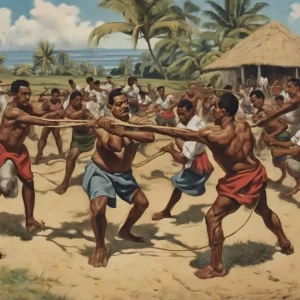 “Veidre Dali,” the tug of war, transcends generations and continues to be enjoyed today. Before ropes were introduced, vines were used, and two teams would face off, each trying to pull the other to their side. This classic game remains a major attraction at events like the Sukuna Bowl, capturing the essence of friendly competition and shared laughter.
“Veidre Dali,” the tug of war, transcends generations and continues to be enjoyed today. Before ropes were introduced, vines were used, and two teams would face off, each trying to pull the other to their side. This classic game remains a major attraction at events like the Sukuna Bowl, capturing the essence of friendly competition and shared laughter. Lutuvakatagane: Lemon-Throwing Fun
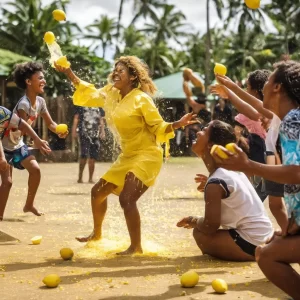 Lutuvakatagane is a game typically played by men, where they engage in a unique form of combat by throwing lemons at each other. The winner is determined by the number of lemons thrown and the accuracy of hitting the target.
Lutuvakatagane is a game typically played by men, where they engage in a unique form of combat by throwing lemons at each other. The winner is determined by the number of lemons thrown and the accuracy of hitting the target.
Veisovia: The Bamboo Challenge
 Veisovia holds fond memories for many Fijians, as it is often played during throughout the week of New Year’s celebrations. Teams, comprising of mataqali or houses in the village, compete in a thrilling match. A bamboo stick is planted on both ends of the ground, and the objective is simple yet challenging—players from one side must make their way to the opposing side’s bamboo without being touched. Points are scored based on the number of times a team touches the opponent’s bamboo. The game spans about a week, with nightly feasting and dancing in the village hall.
Veisovia holds fond memories for many Fijians, as it is often played during throughout the week of New Year’s celebrations. Teams, comprising of mataqali or houses in the village, compete in a thrilling match. A bamboo stick is planted on both ends of the ground, and the objective is simple yet challenging—players from one side must make their way to the opposing side’s bamboo without being touched. Points are scored based on the number of times a team touches the opponent’s bamboo. The game spans about a week, with nightly feasting and dancing in the village hall. Na Veisole: The Mystery Game
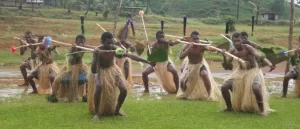 Na Veisole is one of the most enjoyable games, often involving the entire family or village. In this game, a child is covered with masi (tapa cloth) or leaves, leaving no part of their body exposed. The child is then taken to another house or mataqali (landowning unit), and participants must guess the child’s identity without uncovering them. Their only clues are the sounds the child makes, making this a game filled with suspense and laughter.
Na Veisole is one of the most enjoyable games, often involving the entire family or village. In this game, a child is covered with masi (tapa cloth) or leaves, leaving no part of their body exposed. The child is then taken to another house or mataqali (landowning unit), and participants must guess the child’s identity without uncovering them. Their only clues are the sounds the child makes, making this a game filled with suspense and laughter. Na Veiqati: The Chasing Challenge
 Na Veiqati, similar to the game “Dubee” played in primary school, involves two teams. The number of players in one team doesn’t matter. One team stands in the middle of the ground, while the other attempts to reach the opposite side. The team in the middle tries to capture all of the opponents before they can change sides. Survivors from the first run have to repeat the process until all players are caught.
Na Veiqati, similar to the game “Dubee” played in primary school, involves two teams. The number of players in one team doesn’t matter. One team stands in the middle of the ground, while the other attempts to reach the opposite side. The team in the middle tries to capture all of the opponents before they can change sides. Survivors from the first run have to repeat the process until all players are caught. Na Veileveleveti: Fijian Sumo Wrestling
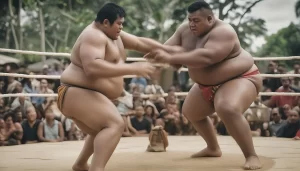 Na Veileveleveti bears a resemblance to the Japanese game of sumo wrestling. In this game, the ring is created from tabakau, woven together from coconut leaves. Two players enter the ring, with only one rule determining the winner—the player who pushes their opponent out of the ring emerges victorious.
Na Veileveleveti bears a resemblance to the Japanese game of sumo wrestling. In this game, the ring is created from tabakau, woven together from coconut leaves. Two players enter the ring, with only one rule determining the winner—the player who pushes their opponent out of the ring emerges victorious. Veisaga: The Thrill of the Mountain
 Veisaga is a game typically played by singles. Young men and women gather on a hilltop, and the men attempt to grab hold of the women. Once a man manages to grasp a woman, they embark on an adventurous descent down the mountain, hugging each other tightly. While injuries may occur, participants are not allowed to show any signs of pain, as laughter and good-natured ribbing are the order of the day.
Veisaga is a game typically played by singles. Young men and women gather on a hilltop, and the men attempt to grab hold of the women. Once a man manages to grasp a woman, they embark on an adventurous descent down the mountain, hugging each other tightly. While injuries may occur, participants are not allowed to show any signs of pain, as laughter and good-natured ribbing are the order of the day. Veisolo: The Playful Encounter
 Veisolo is an unusual game where visiting males are often “attacked” by women. As food is brought to the males, women attempt to scatter it. In the process, the men gently grab the women and playfully throw them to the ground.
Veisolo is an unusual game where visiting males are often “attacked” by women. As food is brought to the males, women attempt to scatter it. In the process, the men gently grab the women and playfully throw them to the ground. Preserving Cultural Heritage Through Games
Efforts to preserve these traditional games are as spirited as the games themselves. Organizations and communities are working tirelessly to pass down these cherished traditions to future generations. The games aren’t just about fun and competition; they’re a bridge connecting the past to the present and ensuring that Fijian culture remains vibrant.
As traditional Fijian games roar back to life, they symbolize the resilience of Fijian culture and the enduring value of traditions that bring people together in joy and unity. They are a cause for celebration and a chance for new generations to experience the thrill, laughter, and camaraderie that have always been at the heart of Fijian traditions.

